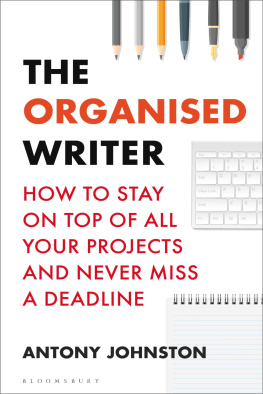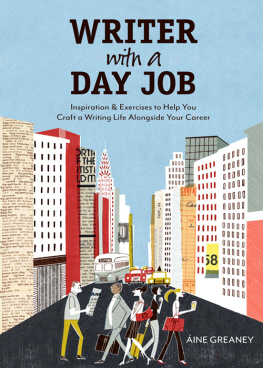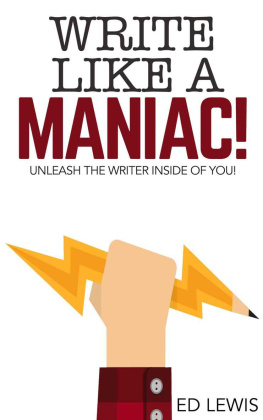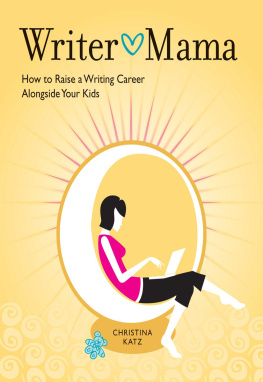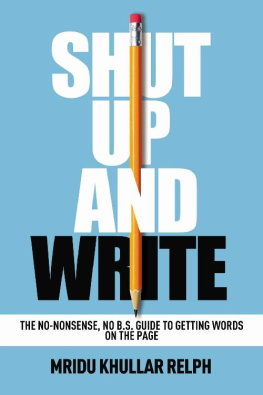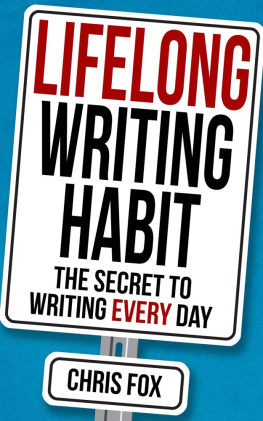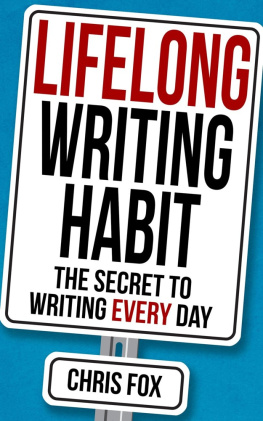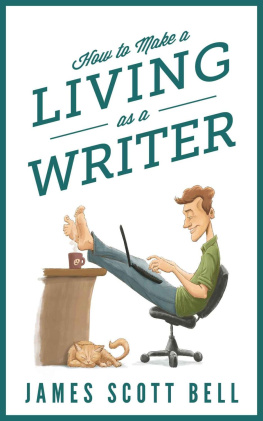
other writers & artists titles include
Writers & Artists Guide to Writing for Children and YA by Linda Strachan
Writers & Artists Guide to How to Get Published by Alysoun Owen
Writers & Artists Guide to How to Hook an Agent by James Rennoldson
Writers & Artists Guide to Self-publishing
Writers & Artists Guide to How to Write by William Ryan
ABOUT THE AUTHOR
Antony Johnston is an award-winning, New York Times bestselling author and creator of The Coldest City , adapted to film as Atomic Blonde starring Charlize Theron. His work spans books, film, graphic novels, videogames, music, podcasts, and more, with titles translated throughout the world. He lives and works in England and is highly organised.
Follow Antony on Twitter @AntonyJohnston
Organised-Writer.com
For Benjamin Read;
where others saw pedantry, he saw a book.

Contents
No book is written entirely alone.
Merlin Mann and David Allen paved the way for my first steps into the world of productivity; Merlins 43 Folders website is still online, and Davids Getting Things Done remains a seminal work in the field.
My old friend and fellow author Benjamin Read wasnt the first to suggest The Organised Writer should be a book, but he was the one to convince me it might be a good idea.
Im fortunate to have a group of thoughtful and incisive beta readers who regularly save me from disappearing up my own filing system. This time Im especially indebted to Helene Wecker, Kieron Gillen, Lisa Schmeiser, and Candice Cardasis for their extensive and invaluable help. Alysoun Owen, my editor at Bloomsbury, cast an invaluable and insightful eye over the manuscript as she guided it to become the book you now hold.
Thanks and apologies are due to my agent Sarah Such, who did not explode when I told her I was pausing my next novel to write this book instead.
Living with a writer takes a certain, rather specialised set of skills, though the partners in question are often too modest to admit it. Marcia, mine own, is one of the most skilful.
Be regular and orderly in your life, so that you may be violent and original in your work.
Gustave Flaubert, Letter to Mme Tennant, 1876
Im a novelist and short-story writer, graphic novelist, screenwriter, videogame scriptwriter and consultant, musician, and podcaster. I attend conventions, talk at conferences, and make regular public appearances. I was first published in 1996 while holding down a day job, and since 2002 Ive been a full-time professional author.
I tell you this not to brag, but to explain why this book exists and why Im qualified to write it.
All writers get stressed out over plot, characters, conflict, resolution, backstory, timelines, world-building, consistency, editors notes, cover art, titles, book blurbs, good reviews, bad reviews you name it. If its related to writing, we get stressed over it. Thats not the problem; writing isnt easy, and no book can help you with that especially if youre trying out new things all the time, as any good author should. Sweating over those things is what makes you a writer.
But you shouldnt be stressing out over missed deadlines; reaching the end of another day and wondering where all the time youd intended to spend writing has gone; trying to remember where you put your notes, your contract, or your cat; discovering you should have filed your tax return two weeks ago; worrying about office and admin tasks piling up; or being unable to relax when you should be having fun with friends and family, because your writing is behind schedule.
That kind of stress will send you to an early grave, make you no fun to be around and even prevent you doing your best work. Its a self-imposed tyranny that prevents you being able to focus on writing, because youre too distracted by all the other tasks you havent yet started, let alone finished.
You can change that if youre willing to put in the work. The first five years of my life as a full-time writer were spent playing endless games of Where on earth did I put that contract? Oh God, the deadline for this script was last week! How can this many unread emails even exist? before I finally realised managing your work isnt something that magically happens around you while you type. It takes practise. It takes discipline.
It takes being an organised writer .
This book is for writers of all kinds. You might be established, or just starting out; a working professional, or an enthusiastic amateur; writing fiction, or non-fiction; have a traditional contract, or prefer to self-publish; write full-time, or part-time; be a novelist, poet, screenwriter, playwright, historian, games writer or something else entirely. Whatever kind of writer you are, whatever your personal situation, The Organised Writer can help you. Its not a book on how to write (see Further reading for some useful resources in that direction), but it is a practical guide designed to help you with all the other aspects of a writers life: getting organised, managing your time, making better use of the time you have, and keeping track of your work and business affairs.
The Organised Writer draws on more than a decade of my own career and working life, during which time Ive successfully juggled dozens of different projects without ever missing a deadline. It describes a holistic system that helps you achieve a structure and routine, freeing you to immerse yourself more fully in creative work by rewarding consistency while boosting creativity.
To that end, first Ill explain the concepts and thinking behind the system, which will help you understand and implement the practical advice that follows. And if you do find something within these pages that absolutely, positively wont work for your situation why not take the raw material as inspiration, use that inspiration to craft something that uniquely suits your style, and finally polish it to make it as useful as possible?
After all, thats what writers do.
A productive timeline
I used everything in this book to write this book.
The truth is, I didnt set out to create a productivity system. When I became a full-time writer, I assumed all Id have to do was write, answer a few emails, and send an invoice every once in a while. What else could a writer possibly have to worry about? I was laughably wrong, but also far from alone; the same error is made by many writers, and other freelance creatives. Its especially common among those of us who are leaving a corporate environment, as we often dont appreciate the sheer amount of administration hidden from our daily working life because our employer took care of it.
After a few years of freelancing my career was taking off, and I had more work than ever but along with more creative work comes ever more non-creative work, boring stuff like invoicing and accounts and tax and office supplies. Sure, we all want to see how much money is coming in. But who wants to take time away from creative writing to deal with office admin and file taxes?
That reluctance to take care of non-creative affairs is how, after about three years of working like this, I found myself drowning in a sea of unanswered emails, unsent (and therefore unpaid) invoices, lost project notes, mislaid schedules, and worst of all in my eyes, the cardinal sin missed deadlines. I never missed deadlines. Except suddenly, Id missed two.

